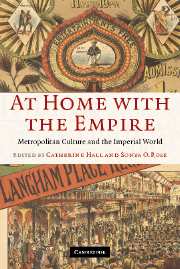Book contents
- Frontmatter
- Contents
- Notes on contributors
- 1 Introduction: being at home with the Empire
- 2 At home with history Macaulay and the History of England
- 3 A homogeneous society? Britain's internal ‘others’, 1800–present
- 4 At home with the Empire: the example of Ireland
- 5 The condition of women, women's writing and the Empire in nineteenth-century Britain
- 6 Sexuality and empire
- 7 Religion and empire at home
- 8 Metropolitan desires and colonial connections: reflections on consumption and empire
- 9 Imagining empire: history, fantasy and literature
- 10 New narratives of imperial politics in the nineteenth century
- 11 Bringing the Empire home: women activists in imperial Britain, 1790s–1930s
- 12 Taking class notes on empire
- 13 Citizenship and empire, 1867–1928
- Select bibliography
- Index
8 - Metropolitan desires and colonial connections: reflections on consumption and empire
Published online by Cambridge University Press: 11 April 2011
- Frontmatter
- Contents
- Notes on contributors
- 1 Introduction: being at home with the Empire
- 2 At home with history Macaulay and the History of England
- 3 A homogeneous society? Britain's internal ‘others’, 1800–present
- 4 At home with the Empire: the example of Ireland
- 5 The condition of women, women's writing and the Empire in nineteenth-century Britain
- 6 Sexuality and empire
- 7 Religion and empire at home
- 8 Metropolitan desires and colonial connections: reflections on consumption and empire
- 9 Imagining empire: history, fantasy and literature
- 10 New narratives of imperial politics in the nineteenth century
- 11 Bringing the Empire home: women activists in imperial Britain, 1790s–1930s
- 12 Taking class notes on empire
- 13 Citizenship and empire, 1867–1928
- Select bibliography
- Index
Summary
There is now a body of writing and debate on the constitutive role of colonial and imperial elements in the material and cultural as well as political history of the United Kingdom, and on the interactions of material, political and cultural developments in that constitutive process. This work has been helped by the growth of studies by economic and social historians of consumption as a dynamic agent in processes of material change since the eighteenth century, rather than just an effect of changes in production or marketing. Interest in histories of consumption in relation to those changes has converged with interest in such histories as a feature of social and cultural change signalled in publications like the volume edited by Brewer and Porter, Consumption and the World of Goods, and those edited by Berg on luxury. Earlier studies of demand, retailing and spreading use or ownership of different products, tended to focus on providers (from large enterprises to corner shopkeepers) rather than customers. Now studies of income levels or standards of living are allied to analyses of the views, values and preferences which have influenced decisions to buy or use particular goods. This convergence is part of the opening up of the study of consumption across a much broader front. From considering it as a discrete area of practical human activity, historians, social scientists, and cultural theorists have enlarged the range of approaches used to understand it, shifting attention from acts of consumption to the persons (‘consumers’) undertaking them, and developing different insights and methods of enquiry.
- Type
- Chapter
- Information
- At Home with the EmpireMetropolitan Culture and the Imperial World, pp. 166 - 190Publisher: Cambridge University PressPrint publication year: 2006
- 8
- Cited by



